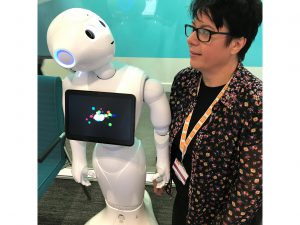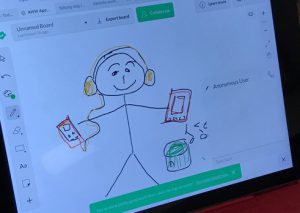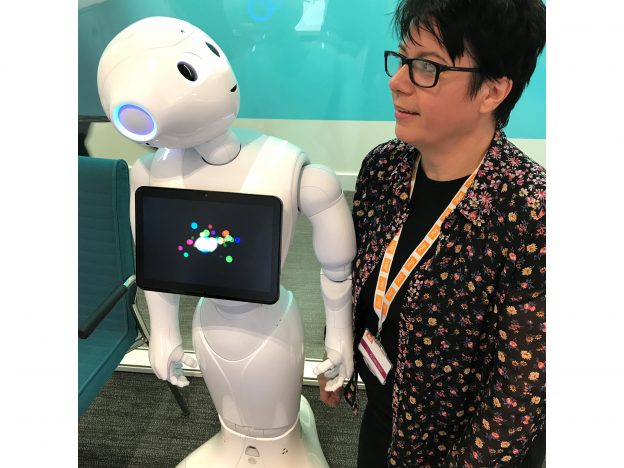What does a twenty first century employee look like?
What kind of jobs will our learners being doing in their lifetimes?
How have our own working environments changed over the years?
Artificial intelligence (AI), virtual reality (VR) and augmented reality (AR) are changing the way we live, work and learn. Have a look at what’s happening with AI and robots in retail, construction, and health to name just a few. BMW have been working on AR for a few years now and you can see what they are developing for mechanics and Mini drivers. The arts and entertainment industries are embracing VR and one example of this is a recent BBC Radio 4 production – Quake. VR and AR are taking gaming to new and exciting places including Pokémon Go (if you didn’t already know!)

Pepper (left) and friend, Jisc 2017
Jisc’s resident futurist, Martin Hamilton has done some great research on emerging technologies and their relationships with industry and education. You can have a look at his slide decks, blog and news feature for more insights and inspiration.
We can’t be sure of the impact of these developments on our future working lives. We may see more professionals working online from home or globally; more job roles in technology and engineering; more digital tools and techniques being used in traditional trades and work places; more careers in specialisms that have yet to be invented or are currently in R&D. But we do know that as educators (like learners), we have to stay up to date with our knowledge, skills and practice, through networking, research and collaboration.
What do our learners have to say? The Jisc digital student tracker project, 2018, paints a picture of the student digital experience across the UK. It gathered evidence from 37,720 learners in higher education, further education and skills. You can have a look at the findings around employability on pages 12 & 13; ‘digital at course level.’
Only 41% of FE and HE learners agreed that their course prepared them for the digital workplace. And only 50% of FE and 69% of HE learners felt that digital skills would be important in their chosen career, suggesting they are not fully aware of the importance of digital skills in the modern workplace.

Twenty first century learner, Jisc workshop 2017
We know that emerging industries require workers with new skills, knowledge and experience. Modern workplaces need employees who are digitally capable, adaptable and confident. How can we use technology to support students across post compulsory education to develop their employability skills, making them work ready?
We’ve been looking at activities and ideas to help. Our report on the evolution of FELTAG includes some good advice and guidance for FE and skills providers about how to approach the development of employability skills and there are examples of effective practice from across the UK.
For in depth information and ideas, have a look at this recent Jisc project which led to the development of an employability skills model – a useful starting point. The model consists of seven strands; basic work readiness; lifelong learning; lifelong employability; professional skills and knowledge; authentic experience; attributes; and high level capabilities.
As a result of the project, Jisc published a report and created an employability toolkit. The toolkit provides a comprehensive framework and guidance that can be used by teams to support dialogue, decision making and planning. It also contains suggestions for approaches and examples of good practice. Using this toolkit we can come up with ideas about how to embed digital tools and techniques into the learner experience that can enhance employability skills and develop digital capability.
The future is here
Let’s make sure our learners are ready for the twenty first century working life when they leave us – and let’s make sure we are ready too!
Edit: *You might also like* Jisc online workshop – ‘Developing learners’ employability skills’
3 April 2019 10.30 – 12.30 Book here

